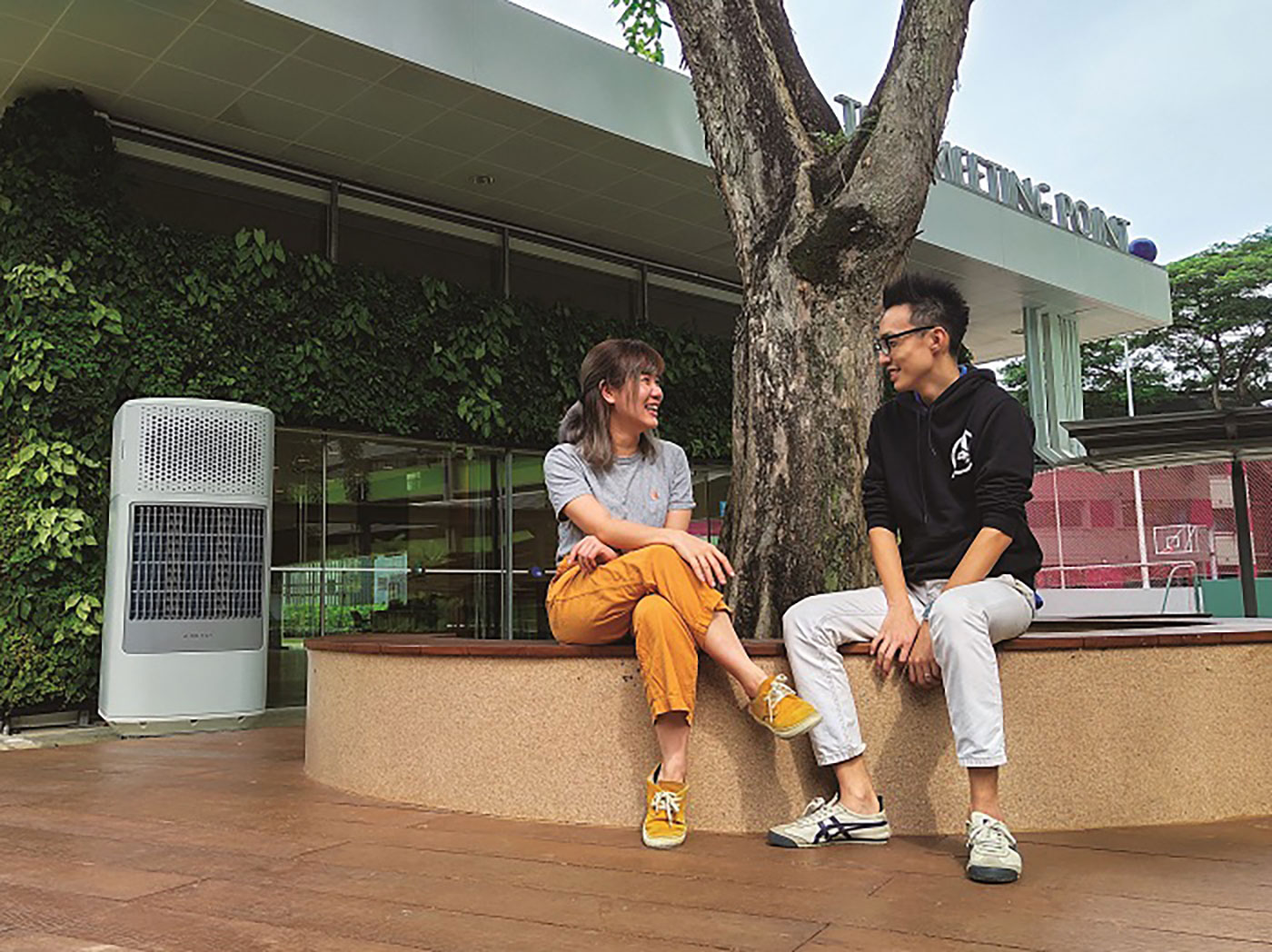Cooling Singapore effectively while saving energy smartly
A look at how Innosparks, Singapore’s first engineering-based open innovation lab and incubator, created the world’s coldest portable evaporative cooler using a fast-fail-fast-iteration design process.

Challenge
According to the Meteorological Service Singapore, Singapore could experience more unusually warm days by the end of the century, with average surface temperatures increasing by as much as 4.6OC . Due to high humidity levels in Singapore, these projected temperature rises will lead to increasing thermal discomfort and heat stress for people outdoors.This makes it even more essential than ever to have sustainable cooling solutions for urban environments.
In 2015, Wildlife Reserves Singapore approached Innosparks to create a breakthrough outdoor cooling solution for the Singapore Zoo, as zoo visitors found Singapore’s high humidity and tropical temperatures uncomfortable.
Existing technologies, such as conventional evaporative coolers and misting fans, had limited cooling impact, while air-conditioning was energy-intensive and unsustainable in outdoor spaces where tourists gathered at the zoo.
Wildlife Reserves Singapore hoped that Innosparks could create an outdoor cooling solution that would provide a better zoo experience for all visitors.
Innosparks, an ST Engineering Open Lab, is the first of its kind engineering-based incubator in Singapore. As a dynamic innovation platform and springboard to new and disruptive technologies, Innosparks offers a pool of skilled resident engineers, beyond just advanced equipment and multidisciplinary engineering labs, to support innovators in accelerating the development of their ideas to market.
Apart from engineers, Innosparks also has UX strategists and designers specialising in branding, communications and marketing. Together with the engineers, they integrate engineering innovation and a human-centred problem solving approach in their work. This is built upon an in-house design thinking process that emphasises a fast-fail-fast-iteration product development cycle.
Solution
Innosparks began with project research, which included understanding users’ perception of heat and discomfort. This was the key to developing the concept of deep cooling in challenging hot and humid environments such as Singapore.
A 5m x 5m tent with a height of 2.5m was set-up and cooled with cold air from an early prototype of an urban air cooler. The tent was cooled to around 25 to 27 degrees Celsius. Individuals from different backgrounds, e.g., students, office workers, were invited to experience the air-conditioned environment and provide feedback through an online survey. Their feedback was generally positive, indicating people felt comfortable and the environment was like a morning or sea breeze.
Through generative user interviews, observation visits at potential use sites, developing use case scenarios, and understanding the differences between various user interactions with a cooling system (e.g. facility managers, service operators, and end-users), a clear concept of portable deep cooling emerged.
The team then entered a stage of design, prototyping and experimentation. They adopted a fast-failure innovation philosophy to build multiple prototypes on after another. Within 18 months, over 50 design iterations and eight systems were built and tested.
Through each iteration, the team investigated, learnt and improved the design. Ultimately, a prototype (Gen 6) was showcased at the Singapore Air Show 2016. This prototype delivered on the concept of sustainable deep cooling, in a tower form factor.

User feedback gathered at the event highlighted the importance of a smaller product footprint and portability of the product design.
The team continued to uncover new areas that needed design changes and tweaks to improve performance and operational benefits to users.
Many working prototypes were built across the design process, and there was a radical downsizing of Gen 6 to create a final form factor that was right-sized and mobile for its use cases.
Outcome
This resulted in the launch of the Airbitat Smart Cooler, powered by the Reevac™ Deep Cooling technology, in 2016. Its cooling effectiveness outperformed conventional evaporative coolers by 50% and used 80% less energy than air conditioners.
Engineered to be eco-friendly, energy-smart and sustainable, it was also designed to be used in outdoor public spaces, commercial spaces and industrial spaces, as well as in close visual and spatial proximity to end users. Hence, its slight curvature, friendly aesthetics, minimalistic design and neutral colours.
The newly launched Airbitat Smart Cooler was put on a six-month trial at the Singapore Zoo, with regular site visits by engineers and the design team to observe and monitor product performance and consumer reception.
The results:
- 90% rated Airbitat as better than other coolers;
- 74% felt that temperature was 26 degree Celsius and below;
- 80% felt more inclined to stay outdoors; and
- 92% rated the design to be good
The Airbitat Smart Cooler has since been deployed to over 100 sites in Singapore, including CHIJMES, Clarke Quay, Balestier Food Centre, Gardens by the Bay, Resorts World Singapore and at events such as the Singapore F1 Grand Prix.
Its innovative cooling technology has also been plugged into other urban cooling applications. Leveraging SP Group’s chilled water supply from the Marina Bay District Cooling network, the Airbitat Smart Cooler was reconfigured to plug into the unusable return chilled water, and transform it into outdoor cooling at the 2017 National Day. Eleven coolers were deployed at around the Floating Platform, bringing much needed cooling relief to the special needs audience sections, as well as volunteer areas.
Recognised for its energy efficiency and environmental sustainability, Airbitat won the ASEAN Energy Award (Special Submission Category) in 2018 – the region’s highest recognition of excellence and innovation for energy efficiency efforts in buildings.
The Launch of Airbitat City Cooler
Continuous iteration is part of the innovation DNA at Innosparks. With the product in market, the team continually gathered feedback from clients and consumers and launched its new and improved version of the cooler in July 2019, renaming it the Airbitat City Cooler.
It now comes with:
- Airbitat Smart Control Mobile App to empower clients to configure performance on the go as well as monitor the cooler’s performance offsite;
- New oscillating louvres for wider coverage; and
- Flushed side handles to enable more ease in moving the unit around.
Ideal for cooling urban spaces, Airbitat City Cooler provides relief from urban heat even in the most challenging environments from tropical to arid climates.







